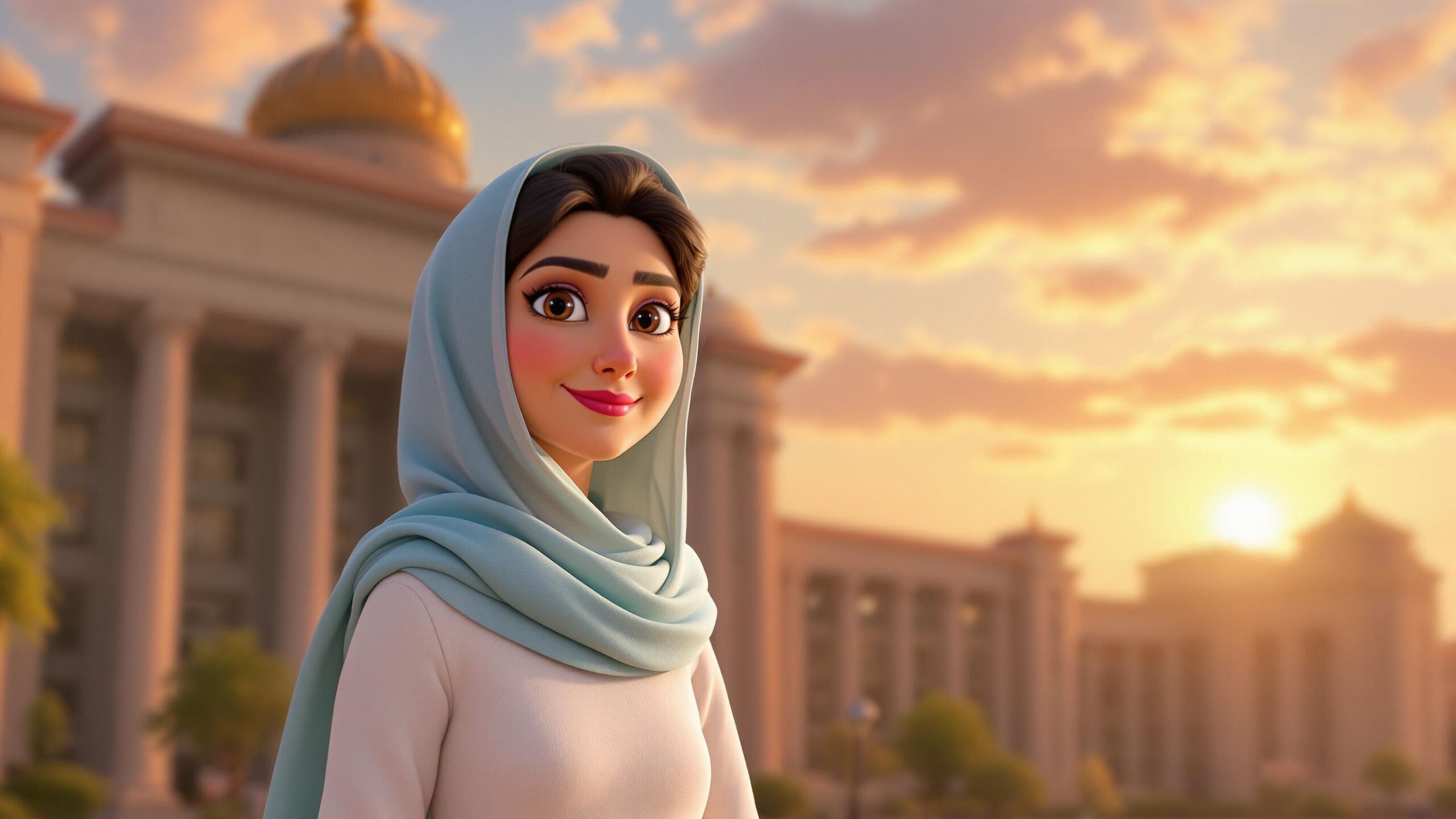In a world where political power has often been confined to the hands of men, Benazir Bhutto shattered centuries of tradition with a single, groundbreaking achievement—she became the first woman to lead a Muslim-majority nation. Her story is one of dazzling highs and devastating lows, of silken elegance cloaked in steely resolve. From her upbringing in a political dynasty to her tragic assassination, Benazir’s life reads like a modern epic. But beyond the headlines and history books, she was a symbol of resilience, a beacon of hope for democracy, and an icon for women everywhere who dared to dream beyond the boundaries drawn for them. In the heart of Pakistan, where the battle for democracy often clashes with entrenched power, Benazir didn’t just make history—she became it. This is the story of a daughter, a leader, a warrior in a sari, who transformed the political landscape not just of her nation, but of the entire Muslim world.
A Daughter of Legacy and Destiny
Born on June 21, 1953, in Karachi, Benazir Bhutto was never just an ordinary girl. Her birth alone was a headline in Pakistan, a country still finding its identity after a tumultuous partition. She was the eldest child of Zulfikar Ali Bhutto, a charismatic and powerful man who would go on to become the Prime Minister of Pakistan. From the moment she could read, Benazir was surrounded by politics. While other children were playing hopscotch, she was absorbing tales of revolution, diplomacy, and constitutional law over dinner conversations. Her early education was elite and international. She studied at Harvard University’s Radcliffe College and later at the University of Oxford, where she became the first Asian woman to be elected president of the Oxford Union—a symbol of her future on the global stage. Despite her pedigree, Benazir’s life was no princess tale. The Bhutto family was both idolized and targeted, with fame that came with deep peril. Her father’s leadership and charisma made him a political rockstar but also attracted deadly enemies. Benazir’s youth was marked by privilege and protest, by laughter in drawing rooms and tears in prison cells. These contrasting experiences molded her into a woman who could navigate the cutthroat world of Pakistani politics with poise and ferocity.
Rising from Tragedy: The Political Baptism
In 1979, when Zulfikar Ali Bhutto was executed by General Zia-ul-Haq’s military regime, Benazir’s life changed forever. Her father’s death was not just a personal tragedy—it was a political crucifixion that lit the fire of destiny in her. Suddenly, the Harvard-Oxford graduate, who once wanted to be a diplomat or journalist, found herself thrust into the frontline of Pakistani politics. At just 26 years old, she became the symbolic leader of the Pakistan Peoples Party (PPP), the same party her father had founded. During the 1980s, Benazir became the face of resistance against Zia’s dictatorship. She endured house arrest, solitary confinement, and repeated harassment by the regime. But despite every obstacle, she never backed down. She became a political phoenix, rising from the ashes of repression with fiery speeches and a firm belief in democracy. She wasn’t just a woman fighting a dictator—she was a symbol of hope in a nation where hope was often forbidden. When Zia died in a mysterious plane crash in 1988, the path cleared for Benazir. Her return from exile was a national event. Streets overflowed with supporters. Children were named after her. Songs were sung in her honor. The people didn’t just want Benazir to lead—they needed her to.
Prime Minister at 35: The Face of a New Era
In December 1988, Benazir Bhutto made history. At 35 years old, she became the Prime Minister of Pakistan, and the first woman to lead a Muslim-majority nation. Cameras flashed. Crowds roared. The world watched in awe. It was more than a victory—it was a revolution wrapped in a silk scarf. Her first term was bursting with symbolism and cautious optimism. She championed women’s rights, expanded healthcare, and promised a new, modernized Pakistan. She appointed women to key posts, emphasized education, and sought to mend bridges with estranged provinces. Her administration even distributed land to landless peasants—an echo of her father’s populist legacy. But leading Pakistan was never going to be a fairy tale. She was hounded by powerful establishment forces, including the military and intelligence agencies. Her government was accused of corruption, often through the actions of her husband Asif Ali Zardari, who gained notoriety as “Mr. 10 Percent.” In 1990, after just 20 months in power, her government was dismissed by the president, citing mismanagement and nepotism.
The Rollercoaster of Democracy
Benazir’s political journey wasn’t a straight line—it was a winding road filled with victories, defeats, betrayals, and comebacks. She returned as Prime Minister in 1993, this time with more experience and political savvy. Her second term focused heavily on economic reform and privatization. But again, she found herself at odds with powerful institutions. Accusations of corruption dogged her administration, and by 1996, she was ousted once more. Still, the people’s love for Benazir never faded. While elite institutions waged war against her, the masses still saw her as their daughter, their sister, their voice. The Bhutto name carried weight, and her charisma never dulled. Whether on the balcony of her home or behind a podium in rural Sindh, her connection with the public was electric. During her time in exile, Benazir never disengaged from politics. She wrote her memoirs, gave speeches across the world, and called attention to the fragility of democracy in Pakistan. Even from abroad, she remained one of the loudest voices advocating for civilian supremacy and women’s rights in the Muslim world.
Champion of Women’s Rights in a Conservative Climate
To be a female leader in Pakistan was no small feat. It was like walking through a minefield in stilettos—graceful but dangerous. Benazir shattered glass ceilings not just by existing but by asserting herself as an agent of change. She pushed for laws that protected women from domestic abuse and discriminatory practices. She opened women’s police stations and appointed female judges. In a country where patriarchal norms often silenced women, Benazir made sure their voices were heard. She showed that a hijab or a dupatta didn’t mean a woman couldn’t lead, debate, or govern. Her life was a living contradiction to extremist narratives. To young girls in the Middle East, North Africa, and South Asia, she was proof that ambition and tradition could coexist. She often said that being a woman in politics gave her a unique strength, a dual lens through which she viewed the world—with empathy and firmness. Her soft-spoken demeanor was never mistaken for weakness. In fact, her calm often masked a razor-sharp mind and an indomitable will.
The Return—and a Final Goodbye
In 2007, after nearly a decade in exile, Benazir Bhutto returned to Pakistan. The political climate was tense. General Pervez Musharraf, a military ruler who had taken over in a coup, was losing popularity. Bhutto’s return electrified the country once more. Her motorcade was greeted by millions, but that very night, a suicide bombing rocked her convoy, killing over 130 people. Benazir survived, but the writing was on the wall—someone wanted her silenced. Despite the threat, she campaigned tirelessly for the upcoming elections. She spoke out against extremism, called for democratic reform, and seemed rejuvenated by the support she received. Her speeches were more passionate than ever, her resolve deeper. Then came the tragic day: December 27, 2007. As she waved to a crowd from her car’s sunroof in Rawalpindi, shots rang out, followed by an explosion. Chaos. Screams. Dust and despair. Benazir Bhutto was assassinated, plunging the country into mourning and confusion. Her death was a seismic moment in Pakistan’s history. Streets filled with weeping supporters. Her funeral procession stretched for miles. A daughter of the East had fallen, but not in vain.
A Legacy Woven Into Pakistan’s Soul
Benazir Bhutto’s story didn’t end with her assassination. It lived on through her children, especially Bilawal Bhutto Zardari, who now carries the torch of the Pakistan Peoples Party. It lived on through countless Pakistani women who entered politics, activism, journalism, and business, inspired by her example. It echoed through every voter who still believes democracy is worth fighting for. Her life was not without flaws. The corruption allegations, the controversial decisions, the compromises with power brokers—all are part of her complex legacy. Yet what remains undeniable is her impact. She opened doors that had long been bolted shut. She proved that a Muslim woman could not only participate in politics but lead from the front. Today, images of Benazir still hang in homes, classrooms, and village tea stalls. Her words are quoted at rallies. Her name sparks debate and admiration in equal measure. Like the phoenix, she rose time and again—through tragedy, through exile, and ultimately through memory.
A Voice That Echoes Beyond Time
Benazir Bhutto remains a towering figure in the history of Pakistan and the Muslim world. Her courage in the face of dictatorship, her resilience after personal loss, and her unwavering belief in democracy turned her into an icon. She was not perfect, but she was powerful. Her life was not easy, but it was extraordinary. In a world that often silences women, Benazir chose to speak—and the world had no choice but to listen. She showed us that leadership isn’t about being fearless; it’s about leading even while afraid. That progress doesn’t come in perfect packages but through messy, passionate, courageous persistence. Her story is more than a chapter in history—it’s a mirror for every girl daring to dream beyond the boundaries set for her. Benazir Bhutto may be gone, but her legacy is stitched into the very fabric of modern Pakistan and the dreams of future generations who believe in freedom, equality, and the right to lead—regardless of gender, religion, or fear.




